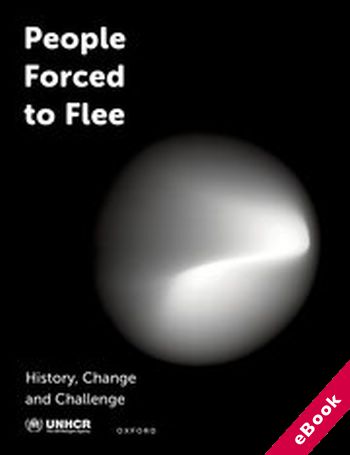We will be closed from 5pm Thursday 17th April for the Easter Bank Holidays, re-opening at 8.30am on Tuesday 22nd April. Any orders placed during this period will be processed when we re-open.

The device(s) you use to access the eBook content must be authorized with an Adobe ID before you download the product otherwise it will fail to register correctly.
For further information see https://www.wildy.com/ebook-formats
Once the order is confirmed an automated e-mail will be sent to you to allow you to download the eBook.
All eBooks are supplied firm sale and cannot be returned. If you believe there is a fault with your eBook then contact us on ebooks@wildy.com and we will help in resolving the issue. This does not affect your statutory rights.
People in danger have received protection in communities beyond their own from the earliest times of recorded history. The causes — war, conflict, violence, persecution, natural disasters, and climate change — are as familiar to readers of the news as to students of the past.
It is 70 years since nations in the wake of World War II drew up the landmark 1951 Convention relating to the Status of Refugees. People Forced to Flee marks this milestone. It is the latest in a long line of publications, stretching back to 1993, that were previously entitled The State of the World's Refugees. The book traces the historic path that led to the 1951 Convention, showing how history was made, by taking the centuries-old ideals of safety and solutions for refugees, to global practice. It maps its progress during which international protection has reached a much broader group of people than initially envisaged. It examines international responses to forced displacement within borders as well as beyond them, and the protection principles that apply to both. It reviews where they have been used with consistency and success, and where they have not. At times, the strength and resolve of the international community seems strong, yet solutions and meaningful solidarity are often elusive. Taking stock today - at this important anniversary – is all the more crucial as the world faces increasing forced displacement. Most is experienced in low- and middle-income countries and persists for generations. People forced to flee face barriers to improving their lives, contributing to the communities in which they live and realizing solutions. Everywhere, an effective response depends on the commitment to international cooperation set down in the 1951 Convention: a vision often compromised by efforts to minimize responsibilities.
There is growing recognition that doing better is a global imperative. Humanitarian and development action has the potential to be transformational, especially when grounded in the local context. People Forced to Flee examines how and where increased development investments in education, health and economic inclusion are helping to improve socioeconomic opportunities both for forcibly displaced persons and their hosts.
In 2018, the international community reached a Global Compact on Refugees for more equitable and sustainable responses. It is receiving deeper support. People Forced to Flee looks at whether that is enough for what could – and should – help define the next 70 years.